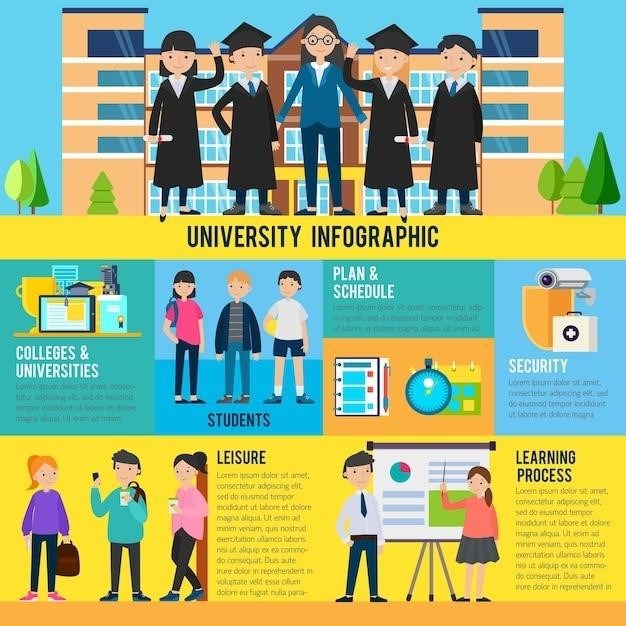How to Become a Straight-A Student⁚ A Comprehensive Guide
This guide unveils effective strategies employed by high-achieving students․ Discover time management techniques, efficient note-taking methods, and powerful exam preparation strategies․ Master active learning, balance academics with personal life, and unlock your academic potential for lasting success․
Effective Study Skills and Time Management
Mastering effective study skills and time management is crucial for academic success․ Start by creating a realistic study schedule that allocates specific time slots for each subject, considering your peak concentration periods․ Break down large tasks into smaller, manageable chunks to avoid feeling overwhelmed․ Utilize time management tools like planners or apps to track your progress and stay organized․ Prioritize tasks based on their urgency and importance, tackling the most demanding ones when you’re most alert․
Incorporate short breaks during study sessions to prevent burnout and maintain focus․ The Pomodoro Technique, involving 25-minute focused work intervals followed by 5-minute breaks, can significantly improve concentration․ Minimize distractions by creating a dedicated study space free from interruptions․ Turn off notifications on your electronic devices and let others know when you need uninterrupted time․ Regularly review and adjust your schedule as needed, adapting to changing academic demands and personal commitments․ Consistent effort and mindful time allocation are key to optimizing your study sessions and maximizing learning efficiency․
Mastering Note-Taking and Active Recall
Effective note-taking is paramount for successful learning․ Develop a personalized note-taking system that suits your learning style․ Experiment with different methods, such as the Cornell Notes system or mind mapping, to find what works best for you․ Focus on capturing key concepts, definitions, and examples rather than transcribing every word․ Use abbreviations, symbols, and visual cues to condense information and enhance comprehension․ Organize your notes logically, using headings, subheadings, and bullet points to structure information effectively․ Leave ample white space for adding annotations, diagrams, and personal reflections later․
Active recall is a powerful technique to reinforce learning and improve retention․ After taking notes, test yourself regularly by attempting to retrieve information from memory without referring to your notes․ Use flashcards, practice questions, or self-testing quizzes to actively engage with the material․ Spaced repetition, reviewing material at increasing intervals, is highly effective for long-term retention․ Regularly review and revise your notes, adding new insights and clarifying any areas of confusion․ By actively engaging with the material through note-taking and recall, you can transform passive learning into a more dynamic and effective process․
Efficient Reading and Problem-Solving Strategies
Effective reading strategies are crucial for academic success․ Before diving into a text, preview the material by skimming headings, subheadings, and summaries to get an overview․ Then, actively engage with the text by highlighting key concepts, annotating in the margins, and summarizing paragraphs in your own words․ Consider using the SQ3R method (Survey, Question, Read, Recite, Review) for a structured approach․ Break down lengthy reading assignments into manageable chunks, taking breaks to avoid fatigue․ After reading, test your comprehension by summarizing the main points or answering comprehension questions․
Problem-solving skills are essential for tackling academic challenges․ When faced with a problem, begin by carefully analyzing the problem statement, identifying key information, and clarifying any ambiguities․ Break down complex problems into smaller, more manageable sub-problems․ Develop a systematic approach to problem-solving, using a step-by-step process or algorithm․ If you get stuck, don’t hesitate to seek help from classmates, teachers, or online resources․ After finding a solution, reflect on the process, noting any mistakes or areas for improvement․ By consistently practicing these strategies, you can enhance your problem-solving abilities․
Exam Preparation and Test-Taking Techniques
Effective exam preparation is key to achieving high scores․ Begin by creating a detailed study schedule, allocating sufficient time for each subject․ Prioritize topics based on their weight in the exam and your understanding․ Utilize active recall techniques, such as flashcards or practice questions, to test your knowledge and identify weak areas․ Instead of passively rereading notes, actively engage with the material by summarizing key concepts, explaining them in your own words, or teaching them to someone else․ Past papers or practice tests are invaluable tools for familiarizing yourself with the exam format and identifying potential problem areas․
During the exam, manage your time effectively by allocating specific time slots for each section․ Read instructions carefully before starting and prioritize questions based on their point value and difficulty․ If you encounter a difficult question, don’t dwell on it; move on and return to it later if time permits․ Show your work clearly and thoroughly, even for simple problems․ Review your answers before submitting the exam to catch any careless errors․ After the exam, reflect on your performance, noting areas for improvement in your preparation and test-taking strategies for future exams․
Utilizing Resources and Seeking Help
Success in academics often hinges on effectively leveraging available resources․ Your educational institution likely provides a wealth of support, including libraries stocked with relevant books and journals, online databases offering scholarly articles, and writing centers offering assistance with essay writing and research․ Don’t hesitate to utilize these resources; they’re designed to aid your learning journey․ Furthermore, many institutions provide tutoring services, connecting students with peer or professional tutors who can offer personalized guidance on challenging subjects․ Active participation in study groups can foster collaborative learning and provide diverse perspectives on course material․
Direct communication with professors is crucial․ Attend office hours to clarify concepts or discuss assignments․ Don’t be afraid to ask questions; professors are there to help you succeed․ Emailing instructors with specific questions can be an efficient way to receive timely assistance․ Finally, remember that seeking help isn’t a sign of weakness but rather a proactive step towards academic excellence․ Embrace the opportunity to learn from others and actively participate in your educational journey․
Time Management and Procrastination
Effective time management is paramount for academic success․ Procrastination, a common hurdle, can significantly impact your ability to complete assignments and study effectively․ Combat this by creating a realistic study schedule that allocates specific time slots for each subject․ Prioritize tasks based on deadlines and importance, tackling the most challenging ones when you are most alert․ Break down large assignments into smaller, manageable chunks to prevent feeling overwhelmed․ Utilize time-blocking techniques to dedicate focused periods to studying, minimizing distractions during these intervals․
Employ productivity tools such as planners, calendars, or digital apps to track your progress and ensure you stay on schedule․ Regularly review your schedule and make necessary adjustments to accommodate unexpected events or changes in workload․ Recognize and address the root causes of your procrastination․ Is it fear of failure, perfectionism, or simply a lack of motivation? Develop coping mechanisms to overcome these obstacles․ Remember that consistent effort, even in small increments, is far more effective than sporadic bursts of activity fueled by looming deadlines․

Creating a Productive Study Environment
Your study environment significantly impacts your concentration and learning effectiveness․ Choose a dedicated study space that is quiet, well-lit, and free from distractions․ This could be a corner in your room, a library, or a coffee shop—anywhere that allows you to focus without interruptions․ Minimize clutter; a clean, organized space promotes mental clarity․ Ensure adequate lighting to reduce eye strain and fatigue․ A comfortable chair and desk are essential to maintain good posture and avoid physical discomfort during long study sessions․
Consider the ambient temperature; a room that is too hot or too cold can hinder concentration․ Minimize auditory distractions by using noise-canceling headphones or playing calming background music․ Keep electronic devices to a minimum, silencing notifications to avoid temptations․ If you’re easily distracted by digital devices, consider using website blockers or apps that limit your access to social media and other non-academic websites during your study time․ Personalize your space with elements that inspire you and create a positive learning atmosphere․ Experiment with different environments to find what works best for your individual needs and preferences․
Goal Setting and Self-Assessment
Setting clear, achievable goals is crucial for academic success․ Instead of aiming for vague aspirations like “get good grades,” create specific, measurable, attainable, relevant, and time-bound (SMART) goals․ For example, instead of “study more,” set a goal like “complete Chapter 3 of the textbook and answer 10 practice problems by Friday․” Break down large assignments into smaller, manageable tasks to prevent feeling overwhelmed․ Regularly assess your progress towards these goals․ Track your study time, note completed tasks, and identify areas where you excel or struggle․
Self-assessment involves honestly evaluating your strengths and weaknesses․ Identify subjects where you require extra attention and develop strategies to address those challenges․ This could involve seeking help from tutors, forming study groups, or utilizing online resources․ Regularly review your notes and identify areas where you need clarification․ Don’t shy away from asking questions in class or seeking help from professors or teaching assistants․ Utilize self-assessment quizzes and practice exams to gauge your understanding and pinpoint areas needing further review․ By consistently setting goals and assessing your progress, you can effectively monitor your academic journey and make necessary adjustments to optimize your learning process․

The Importance of Active Learning
Passive learning, such as simply rereading notes or passively listening in lectures, is significantly less effective than active learning․ Active learning techniques actively engage you with the material, enhancing understanding and retention․ Instead of just reading your textbook, try summarizing key concepts in your own words, creating flashcards, or teaching the material to someone else․ These methods force you to process the information more deeply, strengthening your comprehension․ Another effective strategy is to participate actively in class discussions, asking clarifying questions and engaging with your peers’ ideas․
Active recall is a powerful active learning technique․ This involves testing yourself on the material without looking at your notes or textbook․ Practice retrieving information from memory; this strengthens memory consolidation and helps identify areas needing further review․ Use spaced repetition, reviewing material at increasing intervals, to further enhance retention․ Incorporate diverse learning methods․ Combine reading with note-taking, discussions, and practice problems to cater to different learning styles and keep the learning process engaging and effective․ By actively engaging with the material, you transform studying from a passive exercise into an active process that fosters deeper understanding and improved recall․
Balancing Academics and Personal Life
Maintaining a healthy balance between academics and personal life is crucial for long-term success and well-being․ Overwhelming yourself with studies can lead to burnout and decreased academic performance․ Prioritize self-care; ensure you get adequate sleep, eat nutritious meals, and engage in regular physical activity․ These activities are not time-wasters; they enhance focus, reduce stress, and improve overall cognitive function, ultimately boosting academic productivity․ Schedule dedicated time for relaxation and hobbies; engaging in activities you enjoy helps reduce stress and prevents burnout․
Effective time management is key․ Create a realistic schedule that incorporates both academic and personal commitments․ Use tools like planners or calendars to organize tasks and appointments․ Break down large assignments into smaller, manageable tasks, making them less daunting and easier to fit into your schedule․ Learn to say no to commitments that will overextend you․ Prioritize tasks based on their importance and deadlines․ Remember, a balanced life promotes better focus, reduces stress, and fosters a more positive learning environment․ Prioritizing self-care and managing your time effectively allows you to achieve academic excellence while maintaining a fulfilling and balanced life․
